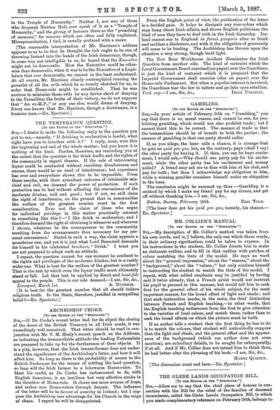THE TEMPERANCE QUESTION.
[1.0 THE EDITOR or THE " SPSCTLTOX."] desire to make the following reply to the question you put to me,—namely, " If drinking in moderation is lawful, what right have you to interfere with it ?" I reply, none, were this the beginning and end of the whole matter; but you know it is nothing of the kind. Pardon, therefore, my reminding you at the outset that the question is the drink traffic and the rights of the community in regard thereto. If the sale of intoxicating liquor could be conducted without resulting drunkenness and excess, there would be no need of interference; but experience has ever and everywhere shown this to be impossible. From these results, with their attendant outcome of intolerable mis- chief and evil, we demand the power of protection. If such protection can be had without affecting the convenience of the moderate drinker, well and good ; but if not, we still claim the right of interference, on the ground that in communities the welfare of the greatest number must be the first consideration. Does not the claim of those who argue for individual privilege in this matter practically amount to something like this ?—' I like drink in moderation, and I therefore demand the right of obtaining it whenever and wherever I choose, whatever be the consequences to the community resulting from the arrangements thus necessary for my per- sonal convenience.' Stated in such a way, the claim appears a monstrous one, and yet it is just what Lord Bramwell demands for himself in his celebrated brochure, "Drink." I trust you are not prepared to adopt such an attitude.
I repeat, the question cannot for one moment be confined to the rights and privileges of the moderate drinker, but is a vastly wider one. What is best for the welfare of the greatest number P That is the test by which even the liquor traffic must ultimately stand or fall. Let that test be applied by direct and bond-fide appeal to the people. This is our sole demand.—I am, Sir, drc., Liverpool, March lat. A. GUTHRIE. [It is best for the greatest number that all should believe religions truth. Is the State, therefore, justified in compelling belief P—En. Spectator.]


































 Previous page
Previous page